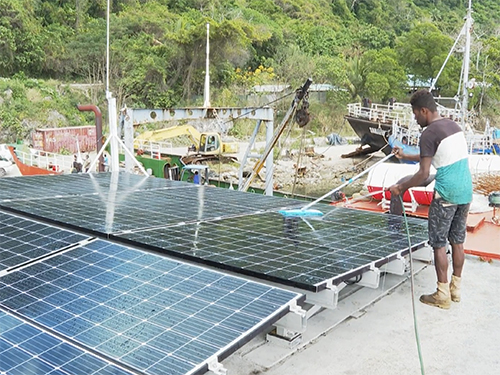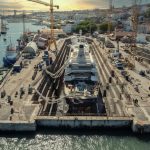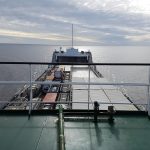A solar panel retrofitting project for a ferry in the Pacific under the MTCC Pacific showed fuel savings of 32% in operation and 87% reduction in GHG emissions at anchor.
A key project to support the reduction of GHG emissions from shipping in developing countries through regional maritime technology cooperation centres has been extended to March 2022. This will allow this strategic project to continue its decarbonisation pilot projects and training and work towards financial sustainability in the longer term.
The Global MTCC Network (GMN) Project is implemented by IMO and funded by the European Union, to improve energy efficiency in the maritime sector, by supporting developing regions in the move towards maritime decarbonization.
This supports the implementation of the Initial IMO Strategy for the reduction of GHG emissions from shipping.
Since their establishment in 2017, four Maritime Technology Cooperation Centres (MTCCs) – based in Africa, Asia, the Caribbean and the Pacific – have established strong regional networks and are becoming important regional players, with technical expertise in the field of maritime energy efficiency and greenhouse gas emissions from shipping.
A solar panel retrofitting project for a ferry in the Pacific under the MTCC Pacific showed fuel savings of 32% in operation and 87% reduction in GHG emissions at anchor.
The Centres have undertaken a range of pilot projects, completed port energy audits and established branch offices in three countries.
During the COVID-19 pandemic, the MTCCs have developed alternative plans and ensured continued engagement with stakeholders, including 10 events held during 2020.
The pilot projects range from data collection to installation of solar power on two ferries in the Pacific. The project has developed an online Training Programme on Maritime Energy Management and the Implementation of MARPOL Annex VI (MTCC Caribbean). MTCC Asia developed an E-learning Course on energy efficiency.
In the first quarter of 2021, activities included regional maritime technology conferences and exhibitions for the Caribbean and Africa; an MTCC-Africa sulphur limit implementation workshop organised in collaboration with the World Maritime University (WMU) and Danish Maritime; and a regional ship technology conference organised by MTCC-Asia.
In the next few months, the GMN will deliver webinars for the Caribbean, organise industry focused engagement in the Pacific and develop and deliver a global webinar series on maritime technology barriers and opportunities.
The MTCCs are also linked to other projects implemented by IMO to help drive forward the changes which are required to decarbonize shipping. The MTCCs boost resources to support local and regional partners.
Source: Hellenic Shipping






